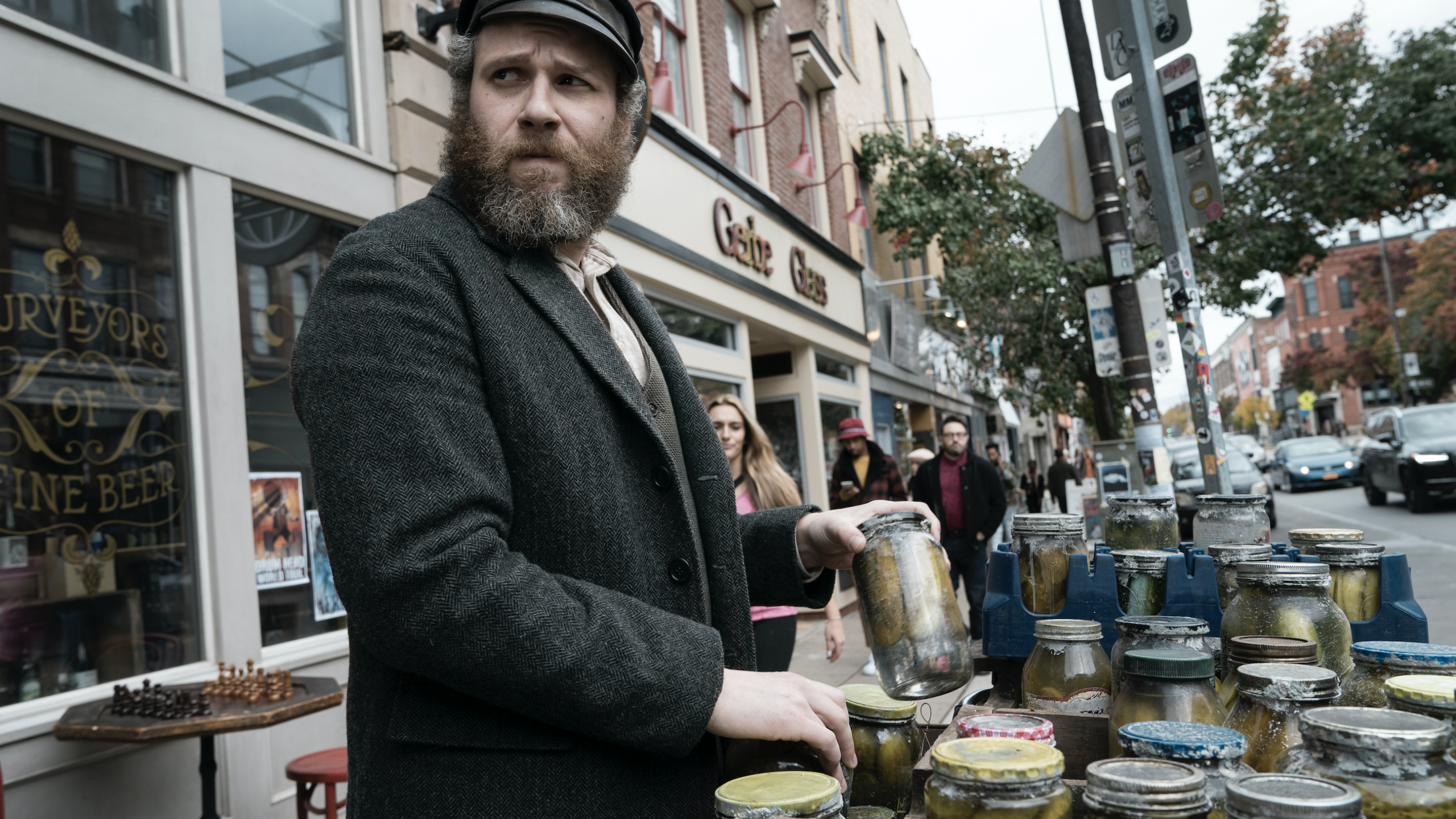While traveling last week, I was able to use idle hours on airplanes and in hotel rooms to catch up on some recent films I had missed. Of everything I watched, the one I imagined I was least likely to write about before I pressed play was An American Pickle, with a screenplay by Simon Rich adapted from his short story. It turned out to be an unexpectedly wholesome exploration of modern family and ancient tradition, timeless faith and modern culture.
Directed by Brandon Trost and starring Seth Rogen, the premise of the film is beyond silly: An Eastern European Jewish immigrant named Herschel Greenbaum (Rogen) falls into a pickle vat in 1919 and is discovered alive and perfectly preserved a century later. Herschel’s only living relative is his great-grandson, Ben, also played by Rogen.
Before his accident, Herschel had lived his life in utter dependence upon God and community, and he was determined to make his family great, with God’s help. Herschel always knew exactly what he was about, who made him, and what his maker was owed. When we meet Ben, he lives comfortably alone, surrounded by consumer goods that would have been unimaginable to his ancestors, but he is languishing to find meaning in anything. Both men have called Brooklyn home, but their worlds could not be more different. Ben has no sense of Chesterton’s “democracy of the dead.” Herschel is completely oblivious to the spirit of the age.
No sooner do Herschel and Ben reconnect than Herschel wants to see his dead wife’s grave and go to schul to mourn. Ben, who has experienced his own terrible losses, balks at the idea. Herschel says, “We will bond over our pain.” Ben takes a pass. He is not religious, he explains, despite his Jewish heritage. Herschel is incredulous: “How do you grieve if you do not say prayers for the dead?” Ben replies unconvincingly, “I’m doing ok.”
Ben represents the too common phenomenon of young people—and especially elite ones—imagining the past to be quaint at best (as we see in Ben’s initial reaction to Herschel) and dangerous at worst (as we see as Herschel reveals more of his opinions and plans). Ben eventually sabotages his great-grandfather, publicizing his flaws instead of covering them with love. Ben is a far cry from Shem and Japheth in Genesis 9:23.
Herschel makes a splash with an artisanal pickle business in hipster Williamsburg, until the world suddenly realizes that his old-world culinary methods are accompanied by old world morality. In a hilarious and poignant series of events, Herschel gets Ben cancelled, then gets himself cancelled, rehabilitated, and finally Ben gets him cancelled again. Everyone loves someone who tells it like it is, until he says that. Herschel comes to believe, “If one thing is true in America, once you say terrible things, you will never be a success.” Ben reassures him (and us), “That is not true at all.”
When Herschel and Ben try to rid themselves of each other for good, hijinks ensue about who is actually who, and both men come to appreciate the other’s joys and sorrows.
Herschel learns twenty-first-century compassion.
Ben learns to pray again.
Both learn a deeper appreciation for the blessings of this life.
Watching Ben and Herschel, I wondered about my own ancestors. Would they be proud of me? Six of my great-grandparents were Protestants, and the other two were Christian Scientists. Would they think my Catholicism a betrayal, or would they come to understand it as a fulfillment of their own deepest spiritual longings? Would they see my electronic devices, clothes, and cars as decadence? Would they recognize any gratitude in me for sacrifices they made for me, sight unseen?
Christians should note the significance for our own families and communities about the way An American Pickle depicts a characteristically Jewish view of family, tradition, success, and faith— albeit humorously. In a way, Herschel has lived to see whether family or community catechesis works better. He fell into his briny slumber just before his wife gave birth, so he was not present to recite the commandments to his son, and to advocate the path of life for the next generation.
But what if Herschel had instead died an old man, surrounded by sons and grandsons “like plants full grown” and daughters and granddaughters “like corner pillars, cut for the building of a palace”? (Psalm 144:12) Perhaps he would still have found his heir adrift from the traditions of his faith, wallowing in what the world gives. Recent data show that younger Jewish people now make up the largest share of Orthodox Jews, but also the largest share of Jewish people with no religious affinity.
At one point, Herschel has very unfortunate words to say about Christ and our Lady; but in some ways his frustrations echo our Lord’s prophecy, “When the Son of Man comes, will he find faith on earth?” (Luke 18:8). Herschel’s concerns are much more immediate, as are most of ours, and as they should be. Are we being faithful stewards of what we have received? Do we dare hope our successors will care at all about the things we may consider today to be absolutely non-negotiable?
An American Pickle is a sweet movie that avoids vulgarity, conveying at least subtly that we all ought to let the past govern the present a bit more than we do. I plan to let my children watch it, and I hope they will be taking notes.
An American Pickle may make some of us appreciate the wisdom of our ancestors more. Conversely, it may make others more resolved to build the family we hope will carry our dreams into the future, correcting ancestral errors. In any case, An American Pickle reminds us that the past is not dead.
And thank God for that.
